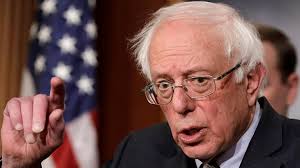Bernie Sanders seeks U.S. presidency again in 2020

U.S. Senator Bernie Sanders, the Vermont progressive whose 2016 White House campaign garnered fervent grassroots support and pushed the Democratic Party sharply to the left, said on Tuesday he would again seek the party’s presidential nomination in 2020.
Sanders, 77, announced his candidacy in an email to supporters, vowing to build a vast movement to confront the special interests that he said dominate government and politics.
Sanders said he would push for many of the same issues that powered his 2016 run and resonated with younger voters, including universal healthcare, raising the hourly minimum wage to $ 15, and free public college tuition.
“Our campaign is about creating a government and economy that works for the many, not just the few,” Sanders said, asking for 1 million people to sign up to kick off his bid.
Sanders’ insurgent 2016 candidacy against front-runner Hillary Clinton ended up capturing 23 state nominating contests, but generated tension between the party’s establishment and liberal wings that split the Democrats in 2016 and still plagues the party.
He joins an already-crowded Democratic race featuring candidates touting many of the ideas he brought into the party mainstream. They include fellow Senators Cory Booker of New Jersey, Kamala Harris of California, Kirsten Gillibrand of New York, Amy Klobuchar of Minnesota and Elizabeth Warren of Massachusetts.
Sanders has been among the leaders in early opinion polls of prospective 2020 Democratic candidates, but a broad range of progressive candidates could make it harder for him to stand out and generate the same level of support as four years ago.
In an interview with SiriusXM radio, Sanders said voters “might want to look at who was there first, and who raised these issues in the past.”
He condemned Republican President Donald Trump in his statement as “the most dangerous president in modern American history,” labeling him “a pathological liar, a fraud, a racist, a sexist, a xenophobe.”
‘I LIKE BERNIE’
Speaking to reporters in the Oval Office, Trump dismissed Sanders’ chances, but said the senator had at least, like himself, been tough on free-trade deals.
“Personally, I think he missed his time, but I like Bernie,” said Trump, who in the past labeled Sanders “Crazy Bernie.”
Sanders enters the race with clear strengths, including broad name recognition, a proven ability to raise money from small-dollar donors and a committed set of passionate supporters.
His campaign reported that Sanders raised more than $ 4 million from 150,000 donors in all 50 states in the first four hours after he announced his run on Tuesday morning. More than 330,000 people had signed on to support Sanders, the campaign said.
But he is also likely to face questions about his age and relevance in a party that is increasingly advancing more diverse and fresh voices, including those of women and minorities – groups that Sanders struggled to win over in 2016.
Sanders has hired Faiz Shakir, an experienced Democratic operative who was the national political director at the American Civil Liberties Union, as campaign manager for 2020, the campaign said. He was previously a senior adviser to former Senate Democratic leader Harry Reid, and worked at the liberal Center for American Progress think tank.
A former mayor of Burlington, Vermont, Sanders won a U.S. House of Representatives seat in 1990, making him the first independent elected to the House in 40 years. In 2006, Sanders won a U.S. Senate seat and in 2018 was voted in for a third six-year term.
His run against Clinton, a former first lady, U.S. senator and secretary of state, was notable because few Democrats seemed inclined to challenge her claim on the nomination. Sanders’ candidacy swiftly caught fire, as he spoke to swelling crowds and garnered ardent support on social media.
Unlike Clinton, he refused to take money from corporate political action committees, or PACs, relying on a flood of small-dollar donations.
When he ultimately conceded and spoke at the Democratic National Convention in support of Clinton, he was jeered by some of his supporters. At the time, Sanders said his populist platform would endure.
The primaries and caucuses that determine the party’s nominee will begin in February 2020 in Iowa, and the Democratic winner is likely to face Trump in the general election in November.
